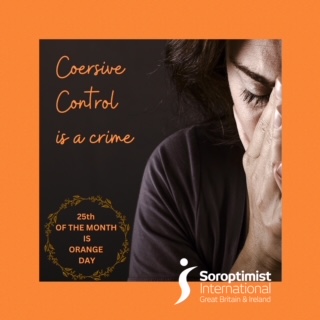On 25th April, Soroptimists are highlighting the abuse of women and girls by persons in a position of trust. Those abusing this trust do so to exercise emotional, mental, financial, or physical and sexual control. It is insidious, it is coercive.
‘Position of trust’ is a legal term which refers to certain roles and settings where an adult has regular and direct contact with children. Examples of positions of trust include teachers, social workers, doctors and healthcare workers, foster carers, faith group leaders, sports coaches, police. It is against the law for someone in a position of trust to engage sexually with a child (under 18) in their care, even if that child is over the age of consent (16).
‘Position of trust’ further applies to adults with care and support needs, and to any other adult who can reasonably expect to have trust in a person in a position of authority, for example, the police.
Sadly, some recent high-profile cases have shown that the very people who are meant to protect and support us have betrayed our trust and failed to safeguard us.
When a police officer or member of police staff abuses their position for sexual purposes, it not only has a devastating impact on the survivor, but also seriously damages confidence in the police, undermining the hard work of trustworthy colleagues.
Abuse of position can include a wide range of different behaviours, including emotional or sexual abuse, and can include single or prolonged contact with the police. Inappropriate behaviour can start reasonably innocently but escalate quickly. Nor is such behaviour confined to specific ranks, roles or forces – which is why the police are focused on driving change right across policing to make sure that abuse of power cannot go unchecked.
Accordingly, there is a need for police officers/staff to feel safe and encouraged to report inappropriate behaviour of colleagues. Colleagues calling out poor behaviour should be the norm and not the exception. For this to happen, officers need to feel protected in an environment of zero tolerance. It is also important for forces to share intelligence about officers and staff to identify patterns of behaviour and prevent further abuse.
Survivors who have spoken out about their experience and identified police officers and staff who have abused their position for sexual purposes are to be applauded for their amazing strength and courage. Also, to be recognised is the role of family members, friends, colleagues, and outreach workers who have encouraged survivors to tell their story. Survivors who report police abuse of power must feel safe, supported, and believed.
There is always going to be a significant power imbalance in any interaction between police and public. The police come into our lives when we are especially vulnerable. Officers and staff must maintain a professional boundary with members of the public, both on and off duty. The police are there to protect us, not exploit us.
Sources:https://learning.nspcc.org.uk. www.policeconduct.gov.uk Learning the lessons 40 – Abuse of position for sexual purpose (APSP)
Pam Robertson


